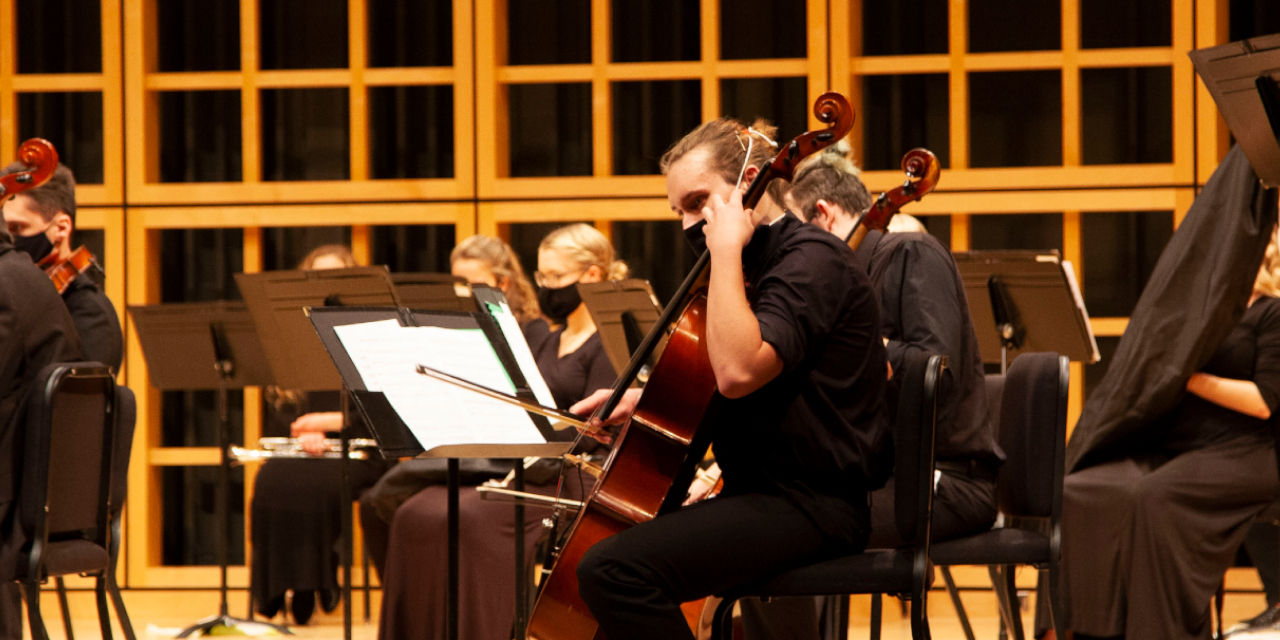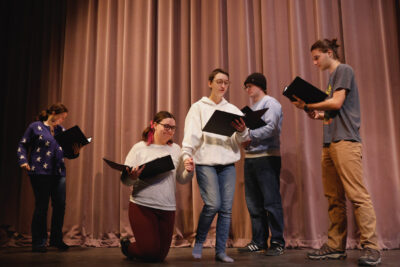Though Sauder Concert Hall will be empty of audience members for this year’s Festival of Carols, the concert – one of Goshen’s most treasured traditions – is still on.
In its 16 previous years, the event has featured performances by each of the college ensembles, as well as scripture readings and carols sung by the three college choirs, the children’s Shout for Joy choir and the audience.Brian Mast, executive director of the Music Center, has been working to make the event possible in the midst of the COVID-19 pandemic.
“We’re trying to capture the things that everyone has come to know and love about Festival of Carols,” he said, “[But] we’re also figuring out how to do that safely.”
The most notable change to the traditional Festival of Carols program is that the concert will be pre-recorded and presented online, allowing audiences to stream the performance from their homes during the holiday season.
Nathan Berkey, a fourth-year music education major, is assisting in the recording process.
“There’s a difference in when you record something and when you perform something live,” he said. “I spend a lot of time in the sound booth… and the choirs will restart the piece over and over again because they want to get it absolutely perfect. I think that’s something that’s so unique about this Festival of Carols – it’s not that we weren’t striving for perfection before, it’s just that there’s this higher expectation [now].”
Berkey added that his role in the sound booth is a little different this year.
“I do a lot of balancing of the different microphones,” he said. “In a live concert, Sauder does an amazing job of balancing the sound for the audience, but in the recording world you have to kind of do some of that manually.”
In addition to switching to a pre-recorded event, this year’s Festival of Carols has undergone some changes to repertoire and programming.
For instance, the Goshen community children’s choir Shout for Joy will have a more limited role this year than in the past. The choir will be joining the Goshen College choirs on only one song.
Mast said the goal is to “try to keep the two groups separate, just for everyone’s safety.”
“They will have really no interaction with college students, and once they’re done singing their verse, they’ll process out,” he said. “We’re limiting the number of people in the hall.”
Other changes to the traditional Festival of Carols format include social distancing for ensembles, 30-minute rehearsal and recording sessions, and masks.
“Everyone has needed to be adaptable to negotiate this particular format,” said H. Roz Woll, assistant professor of music.
As a new addition to the music faculty this year, Woll is excited to experience Festival of Carols for the first time.
“I’ve been conscious that my perception is different because I don’t have a physical memory of doing concerts live in Sauder,” she said.
“I’ve just been like, ‘this sounds great, this hall is amazing!’ But I’m conscious that other people are missing the way we would do it normally.… I can tell that it’s a really important tradition.”
Despite the challenges that COVID-19 restrictions have imposed on the rehearsing and recording process, Berkey appreciates the music department’s commitment to making Festival of Carols possible.
“I find it important for the arts just to keep finding ways to do art,” he said. “I’m very glad that the music department wants isn’t trying to replicate what we do in a normal year, [because] that’s just not possible, but try to make music.”
Woll views the event as a “learning process” and a way to experience music in a new format.
“It feels like a performance for us, and then we get to share it,” she said. “It’s a way of documenting our work this semester, and it’s a way to focus that work for us.”
Mast acknowledges that this year’s Festival of Carols has faced many obstacles, but he is thankful that each ensemble has been able to rehearse and perform as a group this semester.
“It’s awesome just to be able to make music together,” he said. “I didn’t think this would be possible.”



